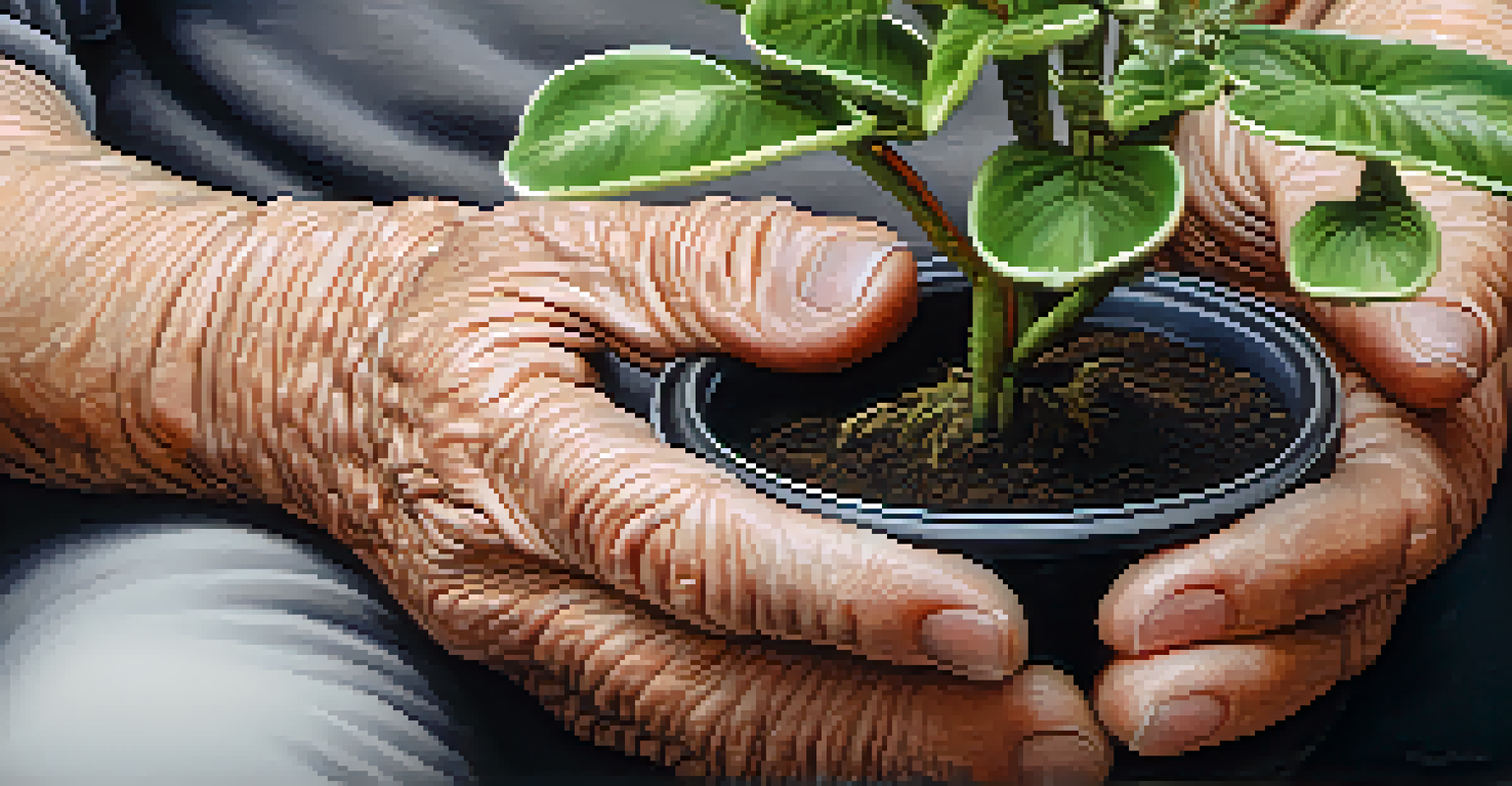Benefits of Medical Marijuana for Seniors: A Comprehensive Guide

Understanding Medical Marijuana: A Primer for Seniors
Medical marijuana refers to the use of cannabis plants for therapeutic purposes. For seniors, it can offer a natural alternative to conventional medications. Understanding its properties, including THC and CBD, is essential, as they serve different purposes in pain relief and other health benefits.
The greatest wealth is health.
THC, or tetrahydrocannabinol, is the component that produces psychoactive effects, while CBD, or cannabidiol, does not. Many seniors prefer CBD for its therapeutic benefits without the 'high.' This distinction allows older adults to choose the right treatment to suit their needs, whether for pain, anxiety, or sleep disorders.
As more states legalize medical marijuana, seniors have greater access to this treatment option. However, it’s crucial to consult with healthcare providers to ensure it’s a safe choice, especially considering potential interactions with existing medications.
Pain Management: Relief for Chronic Conditions
Chronic pain is a common issue among seniors, often stemming from conditions like arthritis, fibromyalgia, or neuropathy. Medical marijuana has shown promise in alleviating this pain through its anti-inflammatory properties. By interacting with the body's endocannabinoid system, it can help reduce pain signals.

Many seniors are turning to cannabis as an alternative to opioids, which come with a risk of addiction and other side effects. With medical marijuana, the risk of dependence is generally lower, making it a safer option for long-term use. This shift can lead to better quality of life and reduced reliance on pharmaceuticals.
Medical Marijuana Benefits Seniors
Medical marijuana offers seniors a natural alternative for managing chronic pain, anxiety, and sleep issues.
Moreover, studies have suggested that medical marijuana can enhance the effectiveness of traditional pain medications. By combining therapies, seniors may experience greater relief and improved functionality in their daily lives.
Managing Anxiety and Depression with Cannabis
Mental health is an essential aspect of overall well-being, and anxiety and depression are prevalent in the senior population. Medical marijuana, particularly CBD, has been recognized for its calming effects, which can help alleviate symptoms of anxiety. By promoting relaxation, it offers seniors a way to manage their mental health effectively.
Good health is not something we can buy. However, it can be an extremely valuable savings account.
Additionally, the stigma surrounding mental health issues is gradually diminishing, allowing seniors to seek help without fear of judgment. Incorporating medical marijuana into their treatment plans can empower individuals to take charge of their mental health, leading to improved emotional resilience.
Further research indicates that cannabis may also enhance mood and social interactions, which are crucial for maintaining relationships and combating loneliness. This can be particularly beneficial for seniors who may feel isolated due to mobility issues or loss of loved ones.
Improving Sleep Quality: A Natural Sleep Aid
Sleep disturbances are common among seniors, often linked to pain, anxiety, or medical conditions. Medical marijuana can serve as a natural sleep aid, helping seniors fall asleep faster and stay asleep longer. This is particularly important, as adequate sleep is vital for overall health and cognitive function.
Many seniors report that cannabis helps them achieve deeper, more restful sleep without the grogginess associated with prescription sleep medications. This can lead to increased energy levels and improved mood during the day. It's like replacing a heavy blanket that suffocates sleep with a comforting embrace that promotes relaxation.
Community and Support Through Cannabis
Engaging in discussions about medical marijuana can help seniors build community and reduce feelings of isolation.
However, it’s essential to find the right strain and dosage, as individual responses to cannabis can vary. Consulting with a healthcare professional can help seniors tailor their approach to using medical marijuana for sleep.
Enhancing Appetite: Combatting Nutritional Deficiencies
Loss of appetite is a frequent issue for seniors, often resulting from medications, medical conditions, or emotional factors. Medical marijuana can stimulate appetite, encouraging seniors to eat more regularly and maintain necessary nutrient levels. This is especially critical for those recovering from illness or surgery.
The 'munchies' effect associated with THC can lead to increased food intake, making meals more enjoyable. This can be a game-changer for seniors who struggle with food aversions or lack of interest in eating. A well-balanced diet plays a vital role in recovery and overall health, making this benefit significant.
Moreover, a better appetite can improve social interactions during mealtimes, fostering connections with family and friends. Sharing meals can enhance quality of life by creating opportunities for engagement and companionship.
Managing Neurological Disorders: A Promising Option
Neurological disorders, such as Alzheimer’s and Parkinson’s, are prevalent among seniors. Preliminary research suggests that medical marijuana may help manage symptoms associated with these conditions. For example, cannabis has shown potential in reducing tremors, improving motor control, and enhancing cognitive function.
In addition to physical symptoms, medical marijuana may also aid in managing behavioral issues related to these disorders. Seniors may experience agitation or aggression, which can be difficult for caregivers to handle. Cannabis offers a more compassionate approach to managing these challenging symptoms.
Importance of Healthcare Guidance
Consulting with healthcare providers is crucial for seniors to safely incorporate medical marijuana into their treatment plans.
However, further research is necessary to establish definitive guidelines for use. Seniors and caregivers should work closely with healthcare professionals to explore the best options for integrating medical marijuana into treatment regimens.
Social Aspects: Building Community Through Cannabis
As perceptions of cannabis evolve, many communities are embracing it as a tool for social connection. Senior centers and community groups are beginning to host events centered around education and use of medical marijuana. These gatherings can foster conversations, reduce stigma, and create a supportive environment for those exploring its benefits.
Sharing experiences and knowledge about medical marijuana can help seniors feel less isolated. This sense of community can improve mental health and provide a sense of belonging, which is crucial for overall well-being. It's like finding a new hobby that brings people together, creating bonds through shared experiences.

Furthermore, engaging in community discussions can empower seniors to advocate for their health and wellness. As they learn more about medical marijuana, they can make informed decisions that positively impact their lives.
Consulting with Healthcare Providers: A Key Step
Before starting any new treatment, especially one involving medical marijuana, it's essential for seniors to consult with their healthcare providers. This step ensures that any potential risks or interactions with existing medications are carefully considered. A collaborative approach can lead to better health outcomes and a tailored treatment plan.
Healthcare providers can also provide valuable guidance on dosages and strains that may be most beneficial. It’s essential for seniors to feel comfortable discussing their needs and concerns, as this can lead to more personalized care. Think of it as having a trusted guide while navigating uncharted territory.
Additionally, ongoing communication with providers allows for adjustments to be made as needed. This flexibility ensures that seniors can adapt their treatment plans to suit their evolving health needs, ultimately leading to a more fulfilling and healthier life.